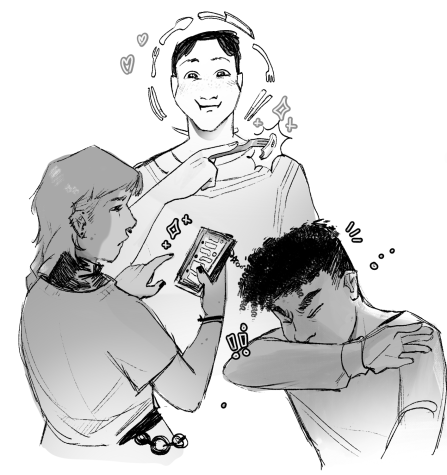Why we need etiquette
April 6, 2023
Etiquette as it is understood today has fallen into irrelevance at the cost of personal social freedom, mutual respect and the ability to be socially mobile. What happened?
I understand etiquette within the context of this article to mean any traditional behavioral display of politeness that exists within a society, regardless of slight differentiation that may emerge on the basis of region and class divides. Though politeness seems like a simple value to uphold, in the minds of many modern college students, especially those attending colleges that don’t themselves enforce formality in apparent ways, etiquette is something that aged out of relevance with their grandparents’ generation. Rather than understanding that their urge to open the door or to cover their mouth when coughing emerges from an understanding of Western social politeness, most people don’t consider these behaviors anything more complex than learned instinct. In fact, many people are likely growing a sense of disdain towards even those sorts of behaviors they themselves exhibit that we call etiquette, as the term alone seems to conjure sentiments of stuffiness, over-formality and social pompousness.
Caring about etiquette is an easy way to be constantly aware of the way your actions impact the people around you, and how you can open your own world up to new spheres that you would perhaps otherwise not be comfortable with the norms of. What is important in situations where etiquette plays a role is utilizing whatever etiquette rules you were raised to understand as polite. Doing so will not only expand the understanding of the people around you, but also display earnestness and genuine respect.
In essence, etiquette is just another form of language that has evolved non-verbally. To reject any attempt at understanding how to be polite is to reject a major outlet of subtle communication. The popular notion that equates “casual” with “irreverent” no longer holds importance in the society we find ourselves in today. The bypassing of dated etiquette rules was once important to break free from a society that heavily enforced things like strict gender roles, but we have (at least within the context of liberal academic spheres such as ours) moved past the need for such a violent disassembling of a structure. We now find ourselves in a position to rediscover what ways we are able to make each other more comfortable socially by interacting respectfully. These gestures of respect can far surpass things like what fork you use at the dinner table; even things like knowing not to flirt with someone’s boyfriend on an intuitive level of mutual respect are etiquette.

Etiquette rules play a crucial role in social interactions, as they facilitate smooth communication and interactions among individuals. They provide a framework for respectful and considerate behavior, ensuring that everyone is treated with dignity and respect. Etiquette rules are especially important when considering class divisions, as they can help bridge the gap between different social classes and promote inclusivity. Etiquette rules, such as showing politeness, consideration and respect towards others regardless of their social class can foster a sense of mutual respect and understanding among individuals from different backgrounds. It is important to remember that etiquette is not about exclusivity or elitism, but it is rather about treating others with kindness, consideration and respect. Sharing our own ways of paying respect to one another is yet another way we can expand the language of behavioral etiquette.
At Whitman, many students I’ve met have expressed discomfort in communicating their needs and feelings to their professors because they do not know how to communicate with someone who is not in their social sphere or age range. Affording your professors the same respect they should be giving you (and knowing how to do that) opens hundreds of new doors for emotional and academic connection with those people who are here for the express purpose of teaching you.
Today, many people seem to believe that any consideration of subtle politeness is a hindrance to them and wonder only what actions they can get away with rather than what actions would be polite or impolite to do. There is an undermining of community and care afoot anywhere where there is such an extreme disillusionment with etiquette that it is no longer used at all. Even among friends, in the most casual of circumstances, there should always be a question of what is kind. In the end, it has nothing to do with formality on any essential level. It is only about a form of social contract of what gestures we can give to show appreciation and respect.
Not only does understanding how our actions are perceived allow us to have mobility outside of our own age bracket and social realms, it allows us to have the decency to build a community rather than trying to go it alone. No one can function without the kindness of others. To limit how much kindness you give based on an understanding that rules are a restriction only serves to liken freedom to a solitary life without support and love, which is no life at all.





